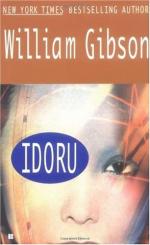|
This section contains 5,186 words (approx. 18 pages at 300 words per page) |

|
SOURCE: Alkon, Paul. “Deus Ex Machina in William Gibson's Cyberpunk Trilogy.” In Fiction 2000: Cyberpunk and the Future of Narrative, edited by George Slusser and Tom Shippey, pp. 75-87. Athens: University of Georgia Press, 1992.
In the following essay, Alkon delineates the elements of myth, allegory, and fairy tale in Gibson's cyberpunk trilogy.
The future of futuristic fiction was first discussed over 150 years ago in Félix Bodin's Le Roman de l'avenir. As I have argued in Origins of Futuristic Fiction, this remarkable book not only outlined the first poetics for futuristic fiction but provided criteria that are still useful in accounting for its appeal and discriminating among its forms. In Bodin's day as now, a major problem for novelists was the difficulty of adequately feeding readers' insatiable hunger for the marvelous. The notable persistence of that appetite through more than two centuries of scientific revolution has been demonstrated by...
|
This section contains 5,186 words (approx. 18 pages at 300 words per page) |

|


